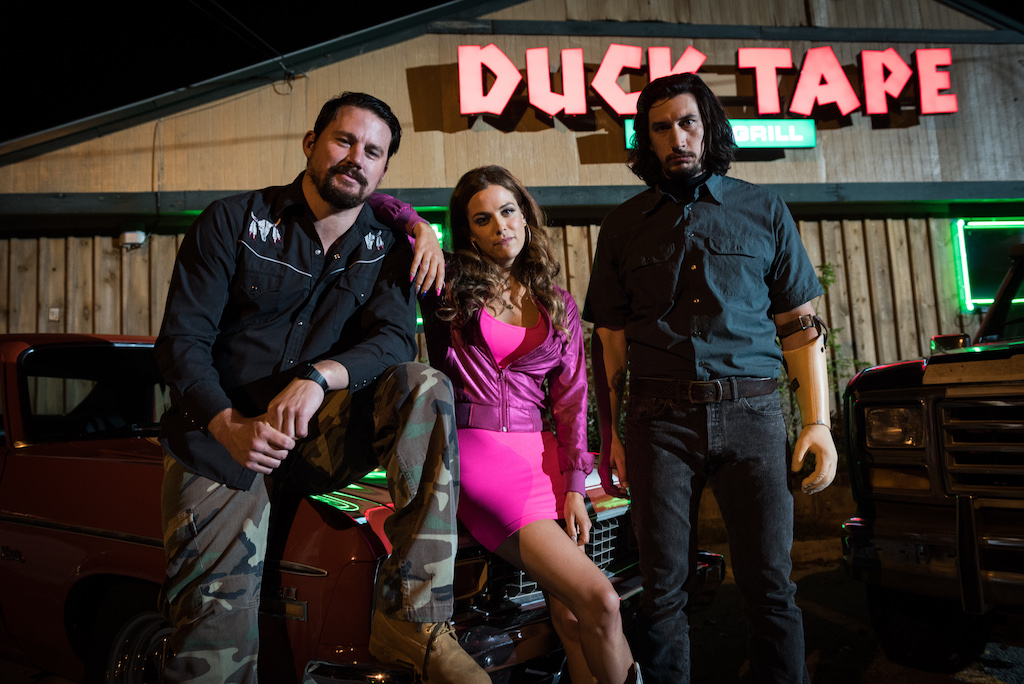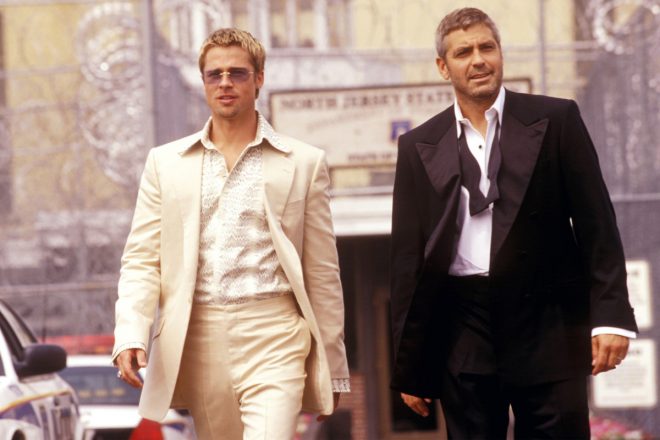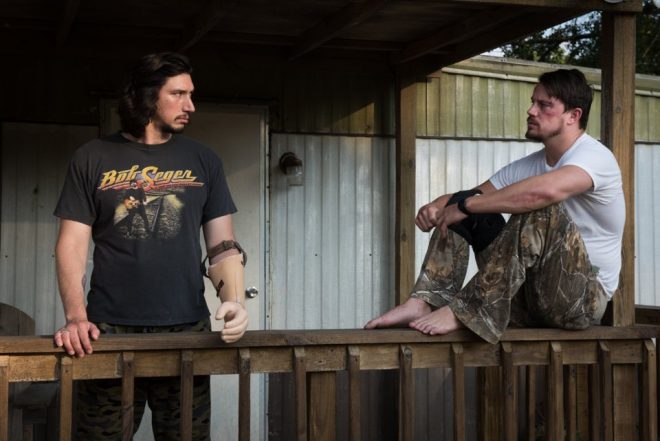‘Logan Lucky’ Is A Slick Heist Film, But Does It Have Anything More To Say?
Steven Soderbergh is back, baby.

Steven Soderbergh is back, baby!
The acclaimed American director has returned to feature film with Logan Lucky, a NASCAR heist-comedy starring Channing Tatum, Adam Driver, Riley Keogh and Daniel Craig (cheekily ‘introduced’ in the credits and marketing material). Soderbergh’s retirement was short-lived — his last film was 2013’s Behind the Candelabra — and, let’s be real, no one expected it to last (see also: Jay-Z, Studio Ghibli’s Hayao Miyazaki, LCD Soundsystem, Jay-Z again, etc etc).
Whether or not you know Soderbergh’s name, you’ve almost certainly seen some of his films — and you’ll recognise them here. The most obvious reference point is the director’s 2001 remake of Ocean’s Eleven, given that this is a heist film.
That’s apparently what drew Soderbergh to the project too. Chatting to Entertainment Weekly, he described Logan Lucky as “an anti-glam version of an Ocean’s movie. Nobody dresses nice. Nobody has nice stuff. They have no money”. There’s even an offhand reference to the modern classic in the dialogue, with someone describing the heist as “Ocean’s 7-11”. So how does it stack up against the legacy?
Ocean’s 7-11
Logan Lucky is structured much like Ocean’s Eleven (and, granted, many other heist movies). We get the gang together, consisting of the Logan family: brothers Jimmy (Tatum) and Clyde (Driver) and their sister Mellie (Keogh), along with the in-car-cer-ate-ed Joe Bang (Craig) and his redneck brothers (Jack Quaid and Brian Gleeson). We learn of their plan — rob the Charlotte Motor Speedway of millions of dollars — but the specifics are obscured. Then there’s the heist itself, which unfolds with plenty of surprises for the audience and characters alike.
Much like Ocean’s Eleven, Logan Lucky also operates as wish fulfilment, just for an entirely different milieu. Ocean’s Eleven is all about casino chic, suave sophistication, an idealised version of masculinity as embodied by George Clooney and Brad Pitt. As The Ringer puts it, it’s “the greatest modern film about movie stars”. Everyone is cool, calm, collected and — did I mention cool? It’s a fantasy for anyone who fancies themselves a dab hand at blackjack, a world where you’re smarter and better-dressed and just plain better than everyone else.

Logan Lucky does the same thing, except it’s pitched at middle Americans rather than men who own too many pinstripe suits. The Logans are the epitome of good-natured folk downtrodden by an unsympathetic system. People talk about the “Logan curse”, and while it’s never fully spelled out, we get the gist by looking at Clyde’s missing forearm (from his time serving in Iraq) or Jimmy’s limp (which sabotaged a promising football career).
That limp sets the film’s events in motion. Jimmy is fired from his mining job after HR spots his limp and identifies it as a “pre-existing condition” and therefore an insurance liability. (How, exactly, Mellie is subject to the Logan curse remains ambiguous – we don’t learn much about her other than she cuts hair and drives fast.)
In short, the Logans represent the kind of people we heard a lot about in the wake of Donald Trump’s election: simple people who ain’t mean no harm to nobody, but who have generally had to suffer a lot of shit as their country’s economy migrated away from manufacturing. Just as Danny Ocean and his boys lived out the fantasy of every gambler who wanted to clear the casino out, the Logans’ heist is a solid slab of wish fulfilment for those inhabiting the ‘Rust Belt’.

That wish fulfilment isn’t solely relegated to stealing a tonne of money, either; the Logans also get to punch the smile off the face of a smug energy drink CEO (Seth MacFarlance, perfectly cast as ‘loathsome’) and generally outsmart those on the ‘higher rungs’ of the society – including Hilary Swank’s stern FBI agent.
There’s nothing wrong with a bit of wish fulfilment, of course. Logan Lucky will play like gangbusters to that audience and, honestly, pretty much anyone. The film is a swiftly-paced piece of entertainment with plenty of laughs and twists alike. Soderbergh’s cinematography is excellent as always — in particular, his wide-lensed compositions do a great job of exaggerating the perceived powerlessness of his protagonists.
It’s not perfect. I felt the plotting towards the back end was a touch too opaque; the final minutes are a little like watching a magic trick explained when you didn’t even realise you were at a magic show. Beyond that, though, I’ve felt this lingering sense of dissatisfaction regarding the film’s politics — or lack thereof.
Rust Belt Politics
Logan Lucky is packed with anti-corporate sentiment, which aligns with Soderbergh’s innovative distribution model for the film. The film’s sole villain, Seth MacFarlance’s character, is an exaggerated, troglodytic personification of crass capitalism. The film takes swipes at the Fast and the Furious franchise and cumbersome car dealerships. And of course there’s Jimmy’s miserable experience with his mining employers — an encapsulation of greed and self-interest that hooks into the recent debates around healthcare in America.
Despite all this, it’s not clear whether Soderbergh or (possibly non-existent) screenwriter Rebecca Blunt have anything substantive to say on how the rise of corporations and the decline of the middle American everyman intersect. The anti-establishment rhetoric and the lionisation of the Rust Belt working class might suggest a film targeted at the growing mass of disenfranchised voters that swept Trump into power… but probably not.
Soderbergh has injected his film with contemporary issues without wanting to actually address them.
I’m likely doing the film a disservice by linking it to Trump. Logan Lucky’s making no attempt to address ‘how we live now’ or anything of the sort. And, hell, the film began production back in 2014, so reading it too closely against current events is a mistake.
My problem isn’t that a film whose production preceded Trump’s election doesn’t have a say on the issue, one way or the other. Rather, my gripe is that Soderbergh has injected his film with contemporary issues without wanting to actually address them; he’s far more interested in the mechanics of the heist than any underlying politics.
That’s pretty consistent with Soderbergh’s career as a whole, with occasional exceptions. He’s a craftsman, first and foremost, which might explain why a director who revolutionised American independent film and won a Best Director Oscar and a Palme d’Or, isn’t a household name.
Steven Soderbergh makes entertaining, well-crafted films. Logan Lucky is no different. If you’re in the mood for a heist-comedy that looks fantastic, you’re not going to go wrong. I guess I can just imagine a version of the film that tells the same basic storyline with a more substantive social commentary running through it. A film that critiques its own wish fulfilment fantasy by giving the underlying structures — race, economic inequality, disenfranchisement — something more than lip service.
In all likelihood, I should just shut up, sit back and appreciate a well-made movie from one of America’s best directors. But I dunno — in an age where the most powerful man in the world implicitly aligns himself with neo-Nazis, it’s getting harder to embrace escapist entertainment.
–
Logan Lucky is in cinemas now.
–
Dave Crewe is a Brisbane-based teacher and freelance film critic who spends way too much of his time watching movies. Read his stuff at ccpopculture or pester him at @dacrewe.